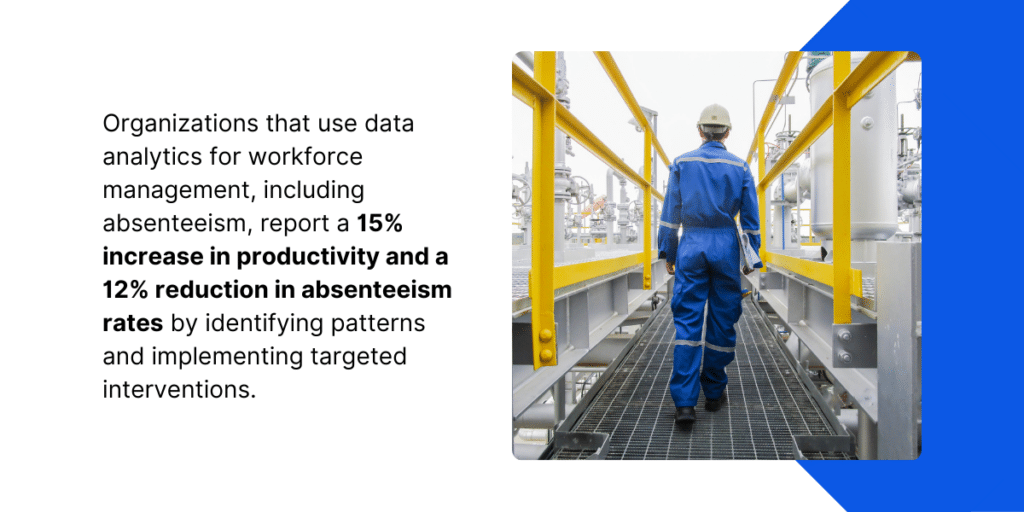The oil and gas industry is a cornerstone of global energy production, but it faces significant challenges, particularly in managing workforce absenteeism. Effective absence management is not just a matter of keeping operations running smoothly; it’s crucial for maintaining safety, ensuring regulatory compliance, and minimizing costly disruptions.
Absenteeism can severely impact the oil and gas sector due to its unique operational environment. Whether it’s scheduled or unscheduled absences, the repercussions on production, safety, and overall efficiency are substantial.
Understanding Leave Management in Oil & Gas
The nature of the industry means that absences can have far-reaching consequences, particularly in high-risk environments where safety is paramount. Absence management in the oil and gas industry involves monitoring, controlling, and mitigating the impact of employee absenteeism. Decreased absenteeism not only improves productivity but also enhances employee morale and workplace accidents.
Overview of Challenges Unique to the Industry
The oil and gas industry faces several unique challenges that exacerbate absenteeism issues:
- Remote Locations: Many operations are situated in remote areas, making it difficult to quickly replace absent employees.
- High-Risk Environment: The industry’s high-risk environment means that safety is a top priority, and any absence can impact safety standards.
- Safety Regulations: Compliance with stringent safety regulations requires maintaining a full and competent workforce at all times.
- Environmental Factors: Harsh environmental conditions can increase the likelihood of absenteeism, reducing overall workforce productivity.
- Health Risks: The nature of the work and working conditions can contribute to higher rates of illness and injury among employees.
Developing Effective Absence Management Strategies
To address absenteeism effectively, companies in the oil and gas industry need to implement robust absence management strategies that are tailored to their unique operational challenges.
1. Establishing Clear Attendance Policies and Procedures
Clear and well-communicated attendance policies are the foundation of effective absence management. These policies should outline expectations, reporting procedures, and the consequences of unexcused absences. By setting clear guidelines, employees understand the importance of maintaining attendance and the impact their absence can have on the organization.
2. Comprehensive Training and Safety Protocols
Investing in comprehensive training programs ensures that all employees are aware of the safety protocols and the importance of adherence to these regulations. Regular training can also help reduce absenteeism by educating employees on how to stay safe in the workplace, thereby minimizing the risk of injury and illness.
3. Utilizing Technology for Tracking and Reporting
Technology plays a crucial role in modern absence management strategies. Absence tracking software can provide real-time data on employee attendance, allowing for quick identification of patterns and potential issues. This technology not only streamlines the management process but also helps in maintaining compliance with safety regulations.
4. Data Analysis and Continuous Improvement
Continuous improvement should be at the heart of any absence management strategy. By analyzing absence data, companies can identify trends and root causes, allowing them to adjust their strategies accordingly. This approach ensures that leave management processes remain effective and responsive to the changing needs of the workforce.

Communication and Employee Engagement
Effective leave management starts with clear communication channels. In an industry where conditions can be challenging it’s vital for employees to report absences easily and without fear. Multiple reporting methods, such as phone lines, a mobile app, and internal messaging systems, enhance accessibility and reduce miscommunication. Keeping employees informed about reporting procedures and any policy changes fosters a trusted and straightforward communication environment.
Involving employees in problem-solving can greatly improve absence management. When employees contribute to discussions about attendance policies, they feel a greater sense of ownership. Feedback mechanisms like surveys and suggestion boxes, along with regular meetings, allow employees to share their perspectives and propose improvements. This collaborative approach helps develop effective policies and boosts morale by showing that employee input is valued.
Balancing accountability with support is crucial for managing absenteeism. Employees need to understand the impact of their attendance on the team and adhere to policies, but they also need support to address underlying issues. Offering flexible scheduling, wellness programs, and mental health resources helps employees manage personal and professional responsibilities. This balanced approach fosters a supportive work environment and helps reduce absenteeism, leading to a more positive and productive workplace.
Technology for Tracking and Reporting
Implementation of Absence Tracking Software
Absence tracking software is crucial in the oil and gas industry, offering real-time attendance data that enables managers to quickly identify and address absenteeism issues.
Key features of absence tracking software include automated reporting, integration with other HR systems, and customizable dashboards that offer insights into attendance patterns. This technology simplifies the management process by consolidating attendance data in one place, reducing manual tracking efforts, and minimizing errors.
Implementing absence-tracking software can also improve compliance with safety regulations by ensuring that staffing levels are maintained and that any gaps in coverage are promptly addressed.
Integration of Mobile Applications for Reporting
Mobile applications enhance the efficiency and accessibility of absence reporting. These apps allow employees to report absences from their smartphones, which is particularly useful in remote or offshore locations where traditional communication methods may be less reliable.
Mobile applications often include features such as real-time notifications, absence reminders, and easy access to attendance policies. This integration helps streamline the reporting process, reduces administrative burdens, and ensures that managers are promptly informed of any absences.
Digital Platforms for Real-time Visibility
Digital platforms provide real-time visibility into employee attendance, which is crucial for managing absenteeism effectively. These platforms offer a centralized view of attendance data, allowing managers to monitor and respond to absenteeism as it occurs.
Real-time visibility supports proactive decision-making by enabling managers to identify trends, assess the impact of absences on operations, and make informed adjustments to staffing levels. This capability is particularly valuable in dynamic environments like the oil and gas industry, where timely responses are essential for maintaining operational efficiency and safety.

Data Analysis and Continuous Improvement
Data analytics is crucial for managing absenteeism by identifying trends and patterns, such as seasonal variations or differences across departments. Analyzing this data helps anticipate issues and implement proactive measures before they affect operations, allowing for evidence-based decision-making and more effective leave management.
Identifying patterns and root causes of absenteeism is essential for creating targeted solutions. Data can reveal high absenteeism in specific roles or times, helping pinpoint causes like job dissatisfaction or health issues. Addressing these root causes with targeted solutions tackles the core problems rather than just the symptoms.
For continuous improvement, companies should regularly adjust their strategies based on data insights and employee feedback. Refining absence management policies according to identified patterns and employee suggestions ensures that strategies remain effective and responsive to the workforce’s evolving needs.
Conclusion
Effective leave management is a critical component of operational success in the oil and gas industry. Given the high-risk nature of operations, where even a small oversight can lead to severe safety incidents or environmental disasters, having the right personnel in place is crucial. By implementing clear policies, leveraging technology, and fostering open communication, companies can manage absenteeism more effectively and maintain safety, compliance, and productivity.
A holistic approach that combines proactive strategies, such as regular absence forecasting and targeted interventions, with continuous improvement ensures that leave management processes remain effective over time. Integrating digital tracking systems and data analytics is particularly important for providing real-time visibility and making informed decisions.
By implementing a robust leave management system, the oil and gas industry can better manage absenteeism, ensuring smooth operations and a safe, efficient work environment.
About the Author
Claire Pieper is the Digital Marketing Specialist for Indeavor. In her role, she specializes in crafting strategic and engaging content, ensuring that customers are well-informed. Claire is dedicated to enhancing the customer experience and optimizing the user journey through Indeavor’s solutions. To learn more or get in touch, connect with Claire on LinkedIn.



